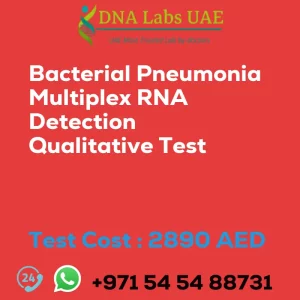MRSA Methicillin-resistant Staphylococcus aureus Multiplex detection and Differentiation RNA Detection Qualitative Test
Components
Price: 1530.0 AED
Sample Condition
Skin boils, biopsy, whole blood, skin lesions, tissue, nasal secretions, nasal swab, etc.
Report Delivery
4th Working Day Email: 48 hours. On phone: 36 hours
Method
Real Time PCR
Test Type
Viral
Doctor
Physician
Test Department
Genetics
Pre Test Information
Need to sign Consent document and bring any clinical history of patient for MRSA (Methicillin-resistant Staphylococcus aureus) Multiplex detection & Differentiation (RNA Detection) Qualitative Test
Test Details
The MRSA (Methicillin-resistant Staphylococcus aureus) Multiplex detection and differentiation qualitative test is a diagnostic test used to detect and differentiate between different strains of MRSA based on their RNA profiles. MRSA is a type of bacteria that has developed resistance to the antibiotic methicillin, making it difficult to treat infections caused by this bacteria.
Traditional methods of detecting MRSA involve culturing the bacteria and testing its resistance to methicillin, which can be time-consuming and may delay appropriate treatment. The MRSA Multiplex detection and differentiation test utilizes RNA detection techniques to quickly and accurately identify the presence of MRSA and determine its strain.
This test is based on the principle of reverse transcription polymerase chain reaction (RT-PCR), which amplifies and detects specific RNA sequences unique to MRSA strains. The test involves collecting a sample, usually a swab or a blood sample, from the patient suspected of having an MRSA infection. The RNA is extracted from the sample and converted into complementary DNA (cDNA) using reverse transcription. The cDNA is then amplified using PCR with specific primers that target MRSA-specific RNA sequences. If MRSA is present in the sample, the PCR amplification will produce a positive result.
The MRSA Multiplex detection and differentiation test can also differentiate between different strains of MRSA based on their RNA profiles. This information is important for epidemiological surveillance and infection control measures, as different strains may have different levels of virulence and resistance to antibiotics.
Overall, the MRSA Multiplex detection and differentiation qualitative test provides a rapid and accurate method for detecting and differentiating MRSA strains based on their RNA profiles. This test can help healthcare providers make informed decisions regarding appropriate treatment and infection control measures for patients with MRSA infections.
| Test Name | MRSA Methicillin-resistant Staphylococcus aureus Multiplex detection and Differentiation RNA Detection Qualitative Test |
|---|---|
| Components | |
| Price | 1530.0 AED |
| Sample Condition | skin boils, biopsy, Whole blood, skin lesions, tissue, nasal secretions, nasal swab etc. |
| Report Delivery | 4th Working Day Email : 48 hours.On phone : 36 hours |
| Method | Real Time PCR |
| Test type | Viral |
| Doctor | Physician |
| Test Department: | Genetics |
| Pre Test Information | Need to sign Consent document and bring any clinical history of patient forMRSA (Methicillin-resistant Staphylococcus aureus ) Multiplex detection & Differentiation (RNA Detection) QualitativeTest |
| Test Details |
The MRSA (Methicillin-resistant Staphylococcus aureus) Multiplex detection and differentiation qualitative test is a diagnostic test used to detect and differentiate between different strains of MRSA based on their RNA profiles. MRSA is a type of bacteria that has developed resistance to the antibiotic methicillin, making it difficult to treat infections caused by this bacteria. Traditional methods of detecting MRSA involve culturing the bacteria and testing its resistance to methicillin, which can be time-consuming and may delay appropriate treatment. The MRSA Multiplex detection and differentiation test utilizes RNA detection techniques to quickly and accurately identify the presence of MRSA and determine its strain. This test is based on the principle of reverse transcription polymerase chain reaction (RT-PCR), which amplifies and detects specific RNA sequences unique to MRSA strains. The test involves collecting a sample, usually a swab or a blood sample, from the patient suspected of having an MRSA infection. The RNA is extracted from the sample and converted into complementary DNA (cDNA) using reverse transcription. The cDNA is then amplified using PCR with specific primers that target MRSA-specific RNA sequences. If MRSA is present in the sample, the PCR amplification will produce a positive result. The MRSA Multiplex detection and differentiation test can also differentiate between different strains of MRSA based on their RNA profiles. This information is important for epidemiological surveillance and infection control measures, as different strains may have different levels of virulence and resistance to antibiotics. Overall, the MRSA Multiplex detection and differentiation qualitative test provides a rapid and accurate method for detecting and differentiating MRSA strains based on their RNA profiles. This test can help healthcare providers make informed decisions regarding appropriate treatment and infection control measures for patients with MRSA infections. |








